Any guitar teacher will tell you to practice standing up, and the first step of practicing standing up is to put on a guitar strap. But how do you put on a guitar strap? That’s what we’ll cover today.
A guitar strap is very beneficial, not only because it frees your hands so you can play comfortably. It allows you to play standing up and, when used correctly, can even help prevent wrist pain.
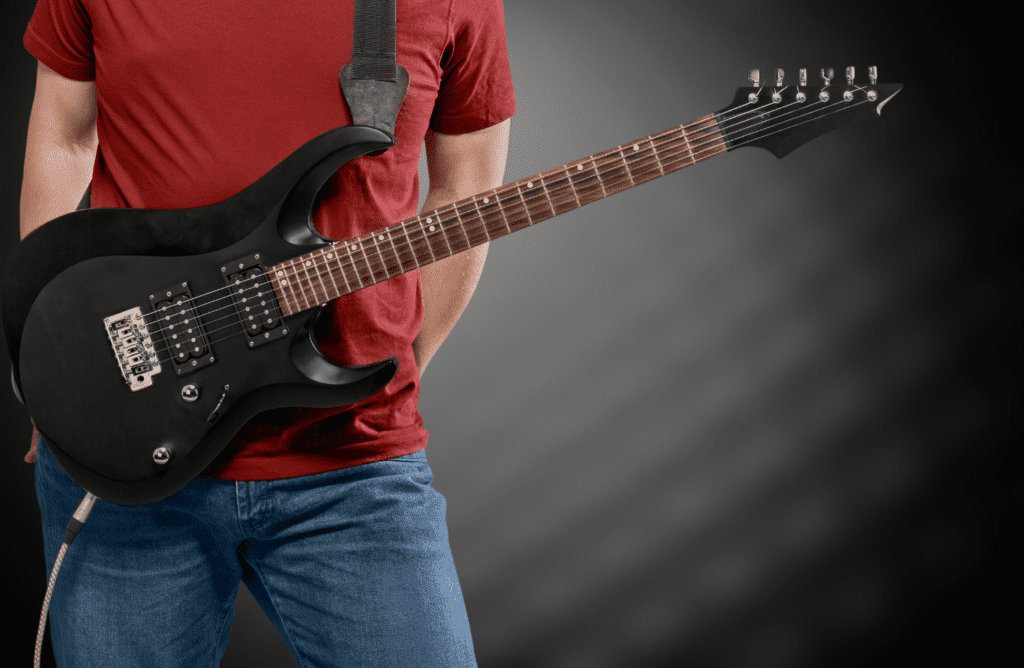
Table of Contents
What’s A Guitar Strap?
A guitar strap is an attachment that permits bassists and guitarists to hold and support a bass or a guitar while playing standing up or performing. The strap attaches to the guitar’s body with strap buttons or ties to hold the guitar. This then frees up your hands for playing the guitar.
Strap buttons are steel pins positioned at the bottom of the body of a guitar and frequently at the base of the neck of a guitar. These pins are also called strap pins.
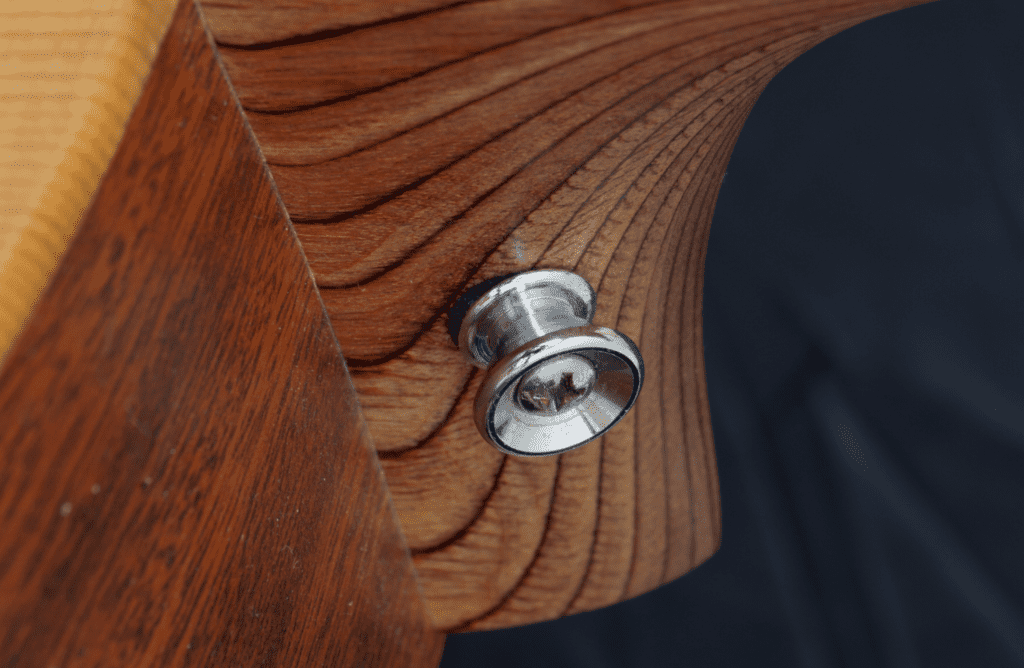
Guitar straps are frequently cotton, nylon, leather, or suede. The ideal strap will depend on your preferences, but the kind of guitar you’re using is also an important determinant. For heavy guitars, a leather strap works well; cotton and nylon are good choices for acoustic guitars and other light, stringed musical instruments like banjos and mandolins.
In the end, a good strap should support the guitar’s weight, be adjustable in length to accommodate guitars of all types and sizes, and be comfortable to wear for an extended period.
The Importance Of Practicing Standing Up
Standing up when playing allows you to move more. If you are experiencing neck or back pain, this is incredibly beneficial. Since sitting in a chair tends to lock in a postural position, being immobile often makes the pain worse.
Practicing standing up also “forces” you to memorize the fretboard because it makes it harder to look down on it while playing. Memorizing the fretboard helps with improvisation, learning scales, and many other valuable skills.
Different Types Of Guitar Straps
There are essentially three types of guitar straps, and each will fit a different type of guitar.
Electric / Bass Guitar Strap
Electric guitar straps are the most common ones. They contain two holes, one for each of the guitar’s strap buttons.
Acoustic Guitar Strap
Acoustic guitars usually come with only one strap button, so their straps are equipped with one hole and one string or two holes (like those for electrics) and an adapter.
Classical Guitar Strap
Classical guitar straps are wrapped around the player’s neck, similarly to saxophone straps, and attached to the guitar by hooking to the sound hole.
How To Put A Strap On An Electric Guitar?
Most electric guitars come with two strap buttons to secure the strap properly. Below are the steps on how to put a strap on an electric guitar:
1. Find the bottom strap button
Hold your guitar vertically with the headstock facing up to locate the bottom strap button. The strap buttons are usually located at the bottom of the guitar’s body.
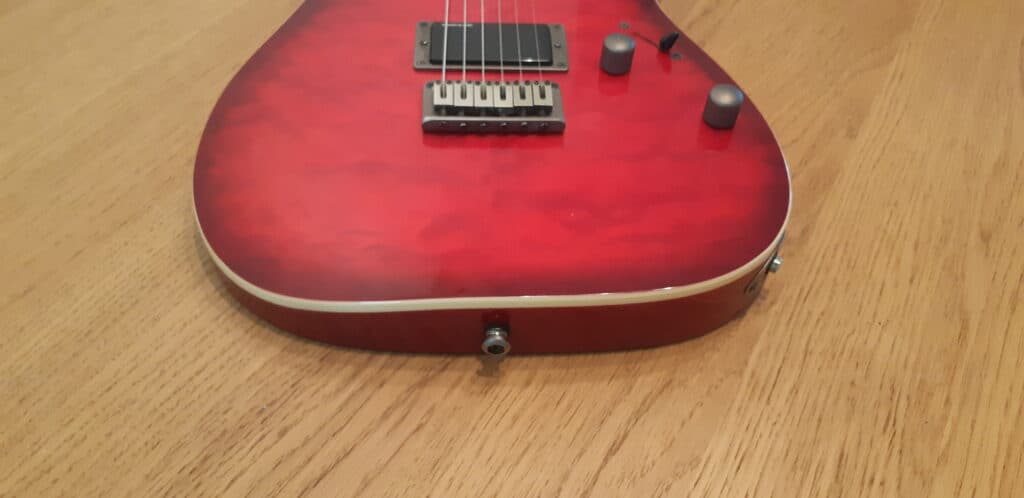
2. Find the top strap button
You can locate the second strap button at the horn or upper curve of the guitar’s body close to where the guitar’s neck joins the body. You can also find it at the neck joint or the heel at the base of the guitar neck.
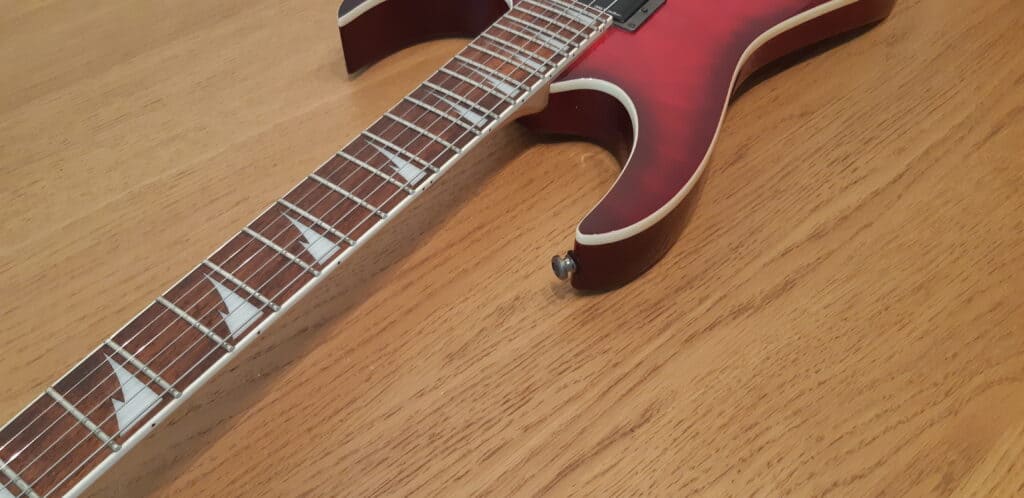
3. Choose the end of the strap that will go on each pin
The patterns or embroidered logos should identify the top strap button side. If the strap features an adjustable buckle, the end where the layers overlap should be attached to the guitar’s bottom button.
4. Attach the strap
Each end of the strap has holes. Push the holes over the bottom and top strap buttons to fasten the strap. Pull the strap near each pin while maintaining your grip on the guitar body to confirm that the strap is firmly connected to each pin.
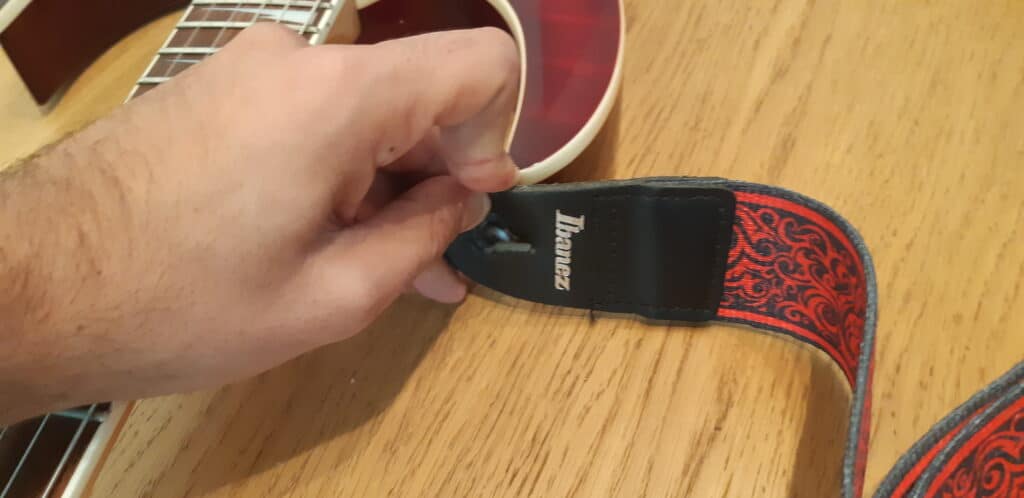

A guitar strap attached to a guitar’s top strap button 
A guitar strap attached to a guitar’s bottom strap button
5. Adjust the strap
If the buckle on the strap is adjustable, slide it to adjust the length of the strap to your preference. Your hands should be easy to move along the neck and strum the strings.
How To Put A Strap On An Acoustic Guitar?
Most acoustic guitars come with only one strap button. Below are the steps on how to put a strap on an acoustic guitar:
1. Find the strap button
On most acoustic guitars, it’s at the bottom of the body, and it usually doubles as the output jack.
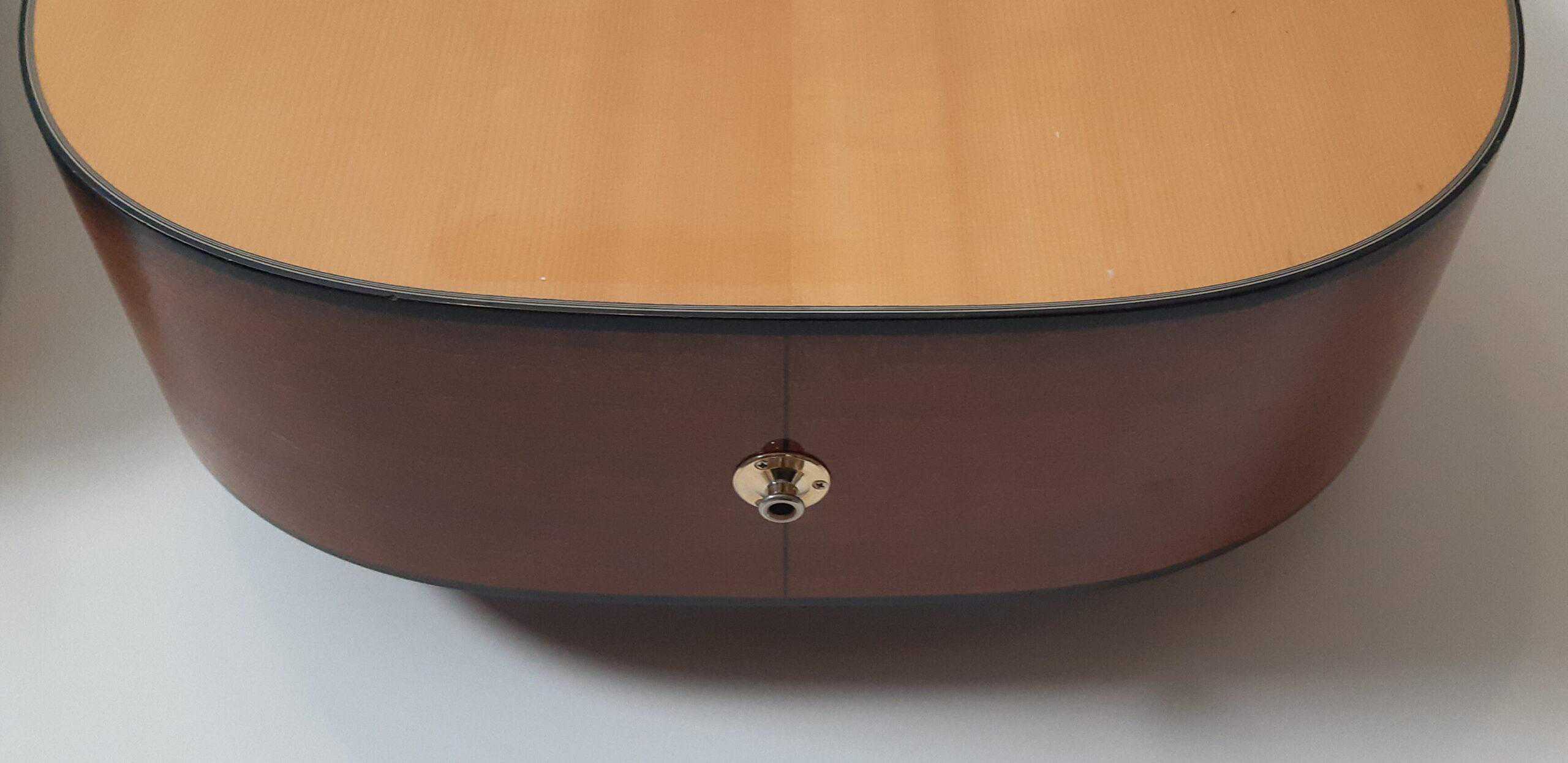
2. Determine how to fasten the other strap end
An acoustic guitar’s lack of a second strap button forces you to attach the opposing end of the strap to the headstock. To secure the other end of the strap to the headstock, you can use a strip of material, such as thick lace or leather. Both options include a strap adapter, which loops around the headstock and has an additional pin, or the additional material that many guitar straps include to tie the other end.
3. Connect one end of the strap to the bottom pin
Push the strap hole over the strap button to attach the strap to the bottom button.
4. Connect the other end of the strap to the headstock
To connect a lace to the other end of your strap, insert it through the strap holes. Next, connect the strap using the lace on the headstock fretboard and neck but below the first tuning peg. Secure the lace with a solid double knot.
If you are utilizing a strap adapter, you should thread it under the strings on the headstock, between the first tuning peg and the fretboard. The strap button on the adapter should then be pushed through the strap hole.
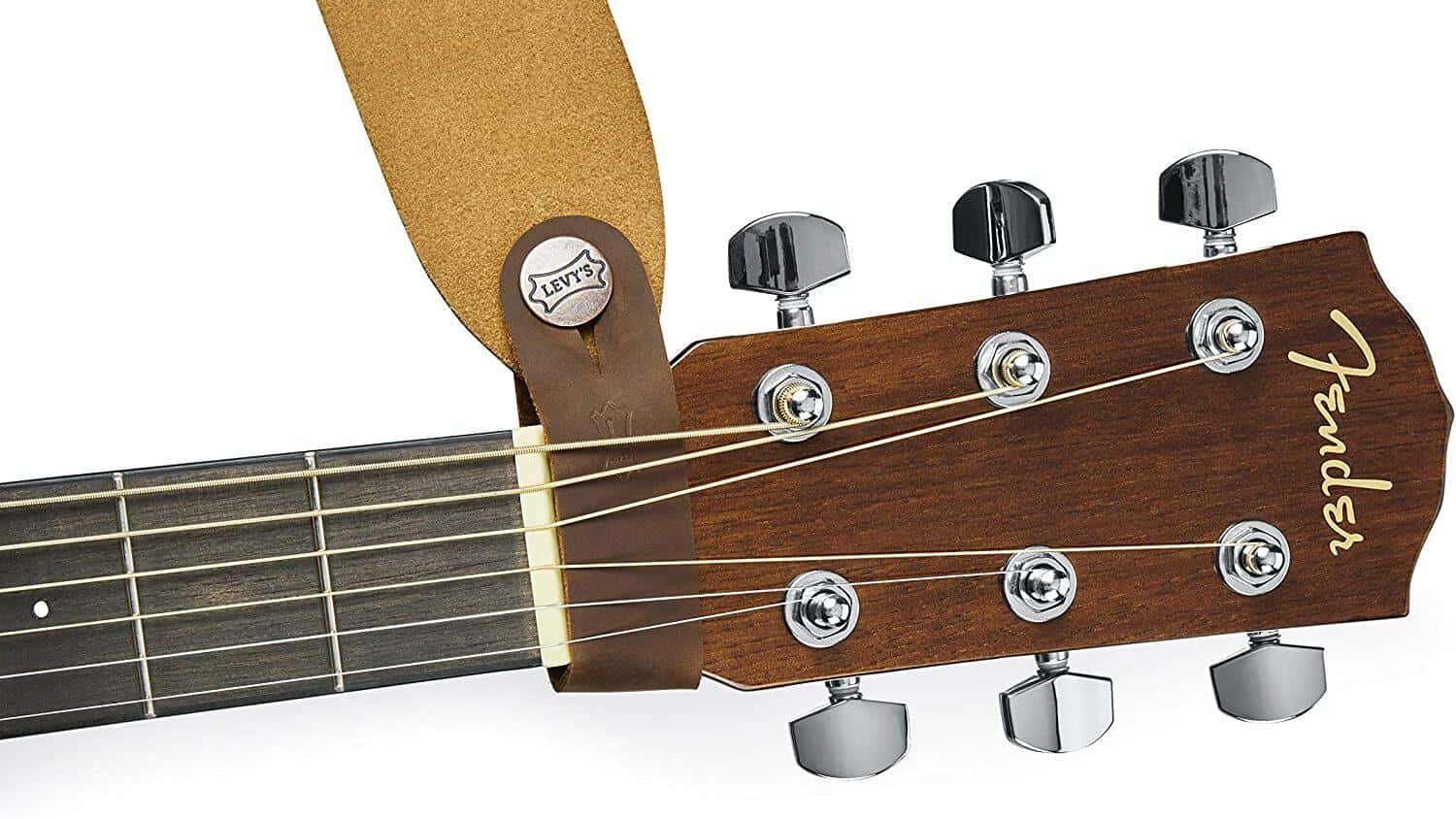
How To Put A Strap On A Classical Guitar?
In most instances, classical guitars do not come with strap buttons. This is because they are not designed to be played when standing. But this does not mean you can not connect a strap to them.
Below are the steps on how to put a strap on a classical guitar:
1. Ensure that you buy the right strap for a classical guitar
Straps explicitly designed for classical guitars and other musical instruments that do not have straps are available in music stores and big online retail stores.
2. Place the strap loop around your neck
A loop on a standard classical guitar strap is worn around the neck. The loop unites in the middle to form a strap that securely holds your guitar.
3. Run the strap behind the guitar’s waist
Grab the classical guitar by the neck and adjust it so that the strap around your neck rests on the waist of the instrument. Ensure enough strap is hanging below your guitar to wrap around the guitar’s bottom and hook in the sound hole.
4. Hook the strap to the soundhole
You should hook the strap on the bottom edge of the sound hole.
5. When utilizing the strap, place one hand on the guitar
Your strumming arm should hold your guitar upright while you play. If no hand is placed on the guitar, it will tip forward and perhaps fall out of the strap.
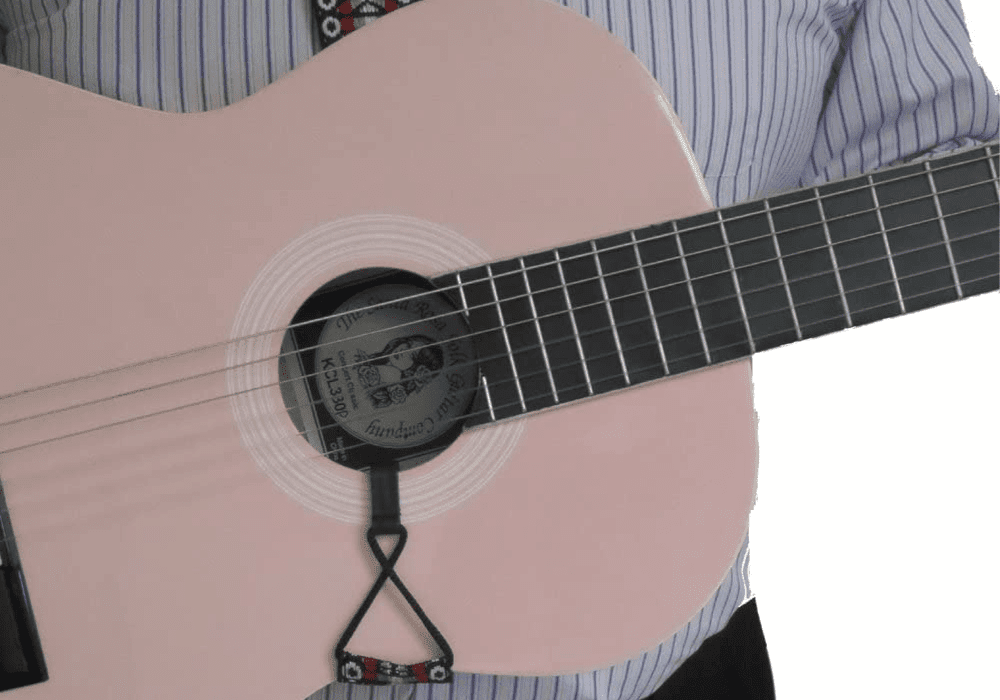
How To Wear A Guitar Strap
Wearing a strap is an easy task. Below are the steps you should follow:
- Ensure that there are no twists on the guitar strap
- Wear the guitar strap. It should go over your neck and rest over your fretting hand shoulder.
- Adjust the strap to your desired length
Finishing Thoughts
A guitar strap is essential if you want to play your guitar when standing. Connecting a guitar strap is an easy task, as demonstrated in this article. Now that you have it all figured out, you might want to look into some strap locks to ensure your guitar stays properly connected to the strap.
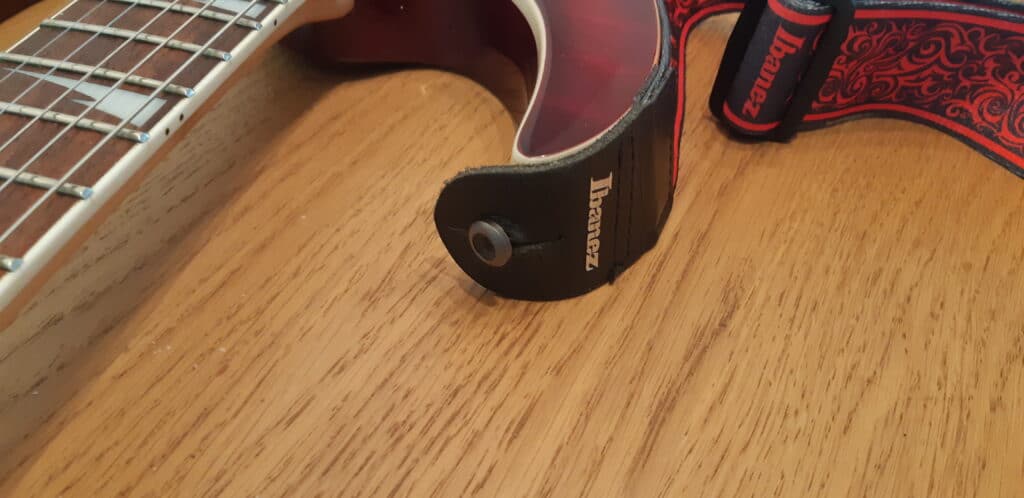
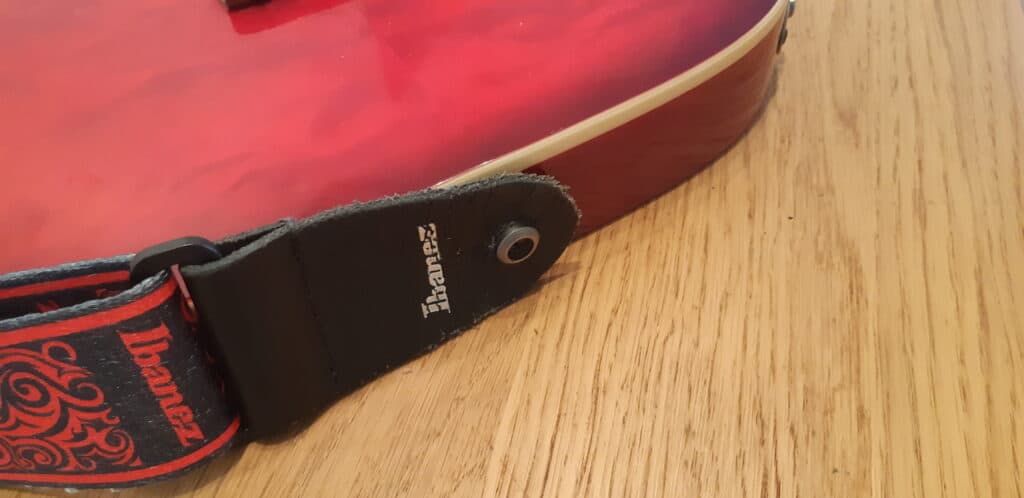
After 3 years of playing guitar I just figured out that I put the strap the wrong way